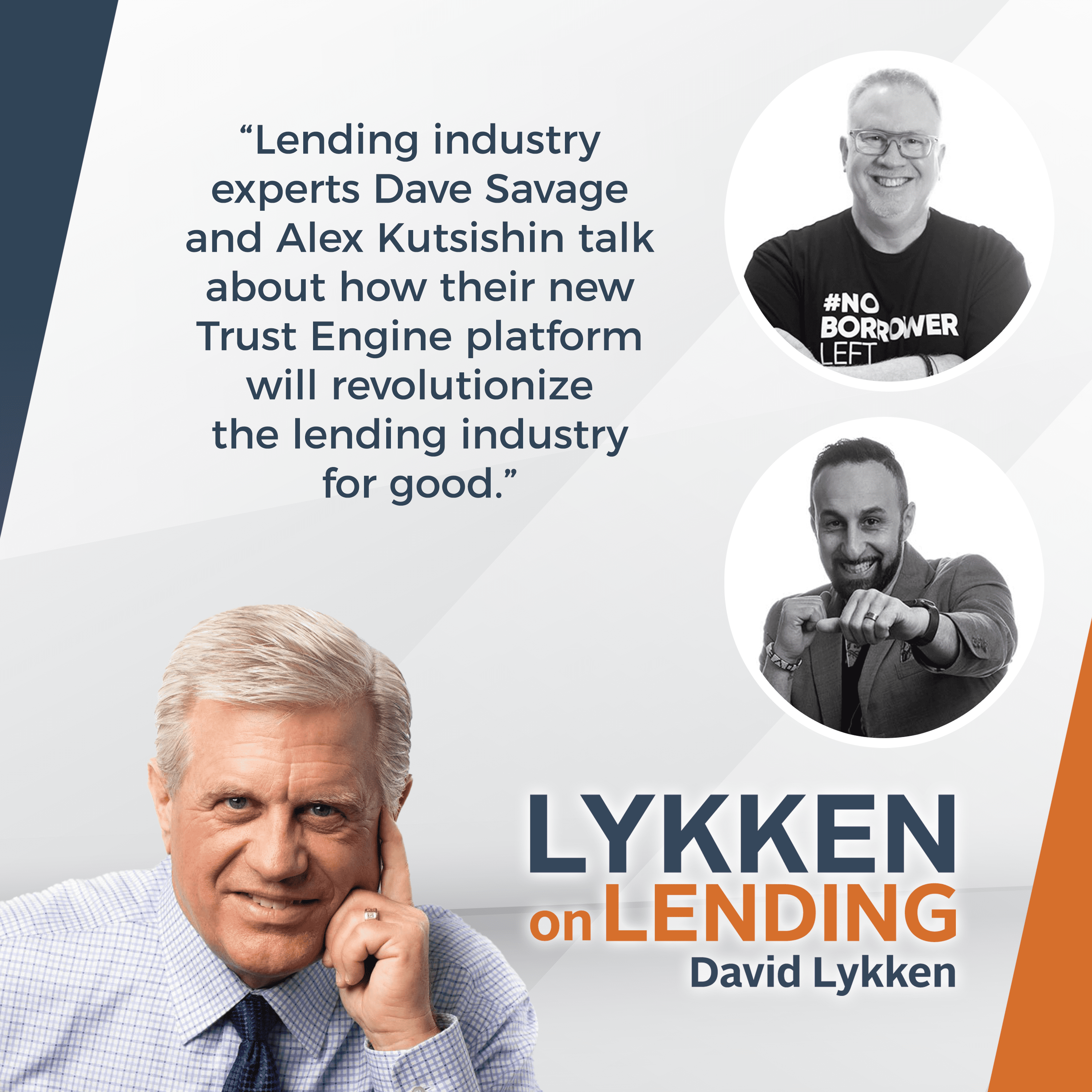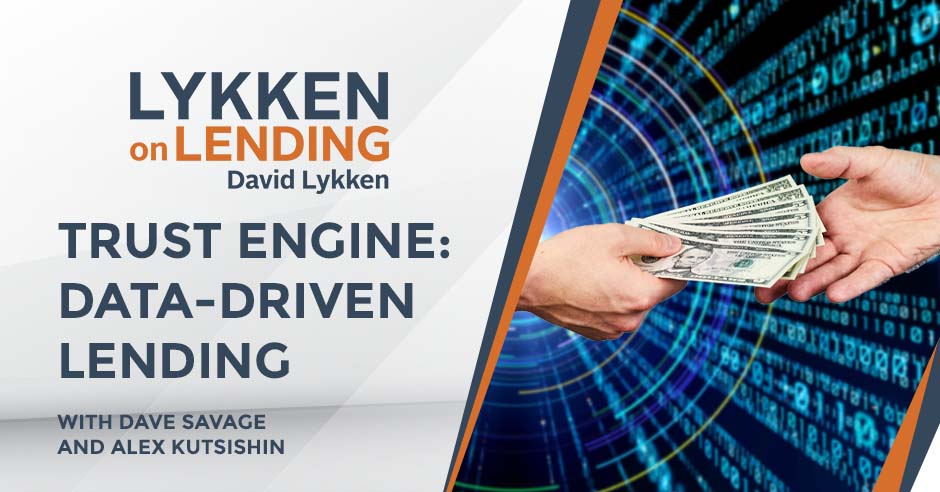Mortgages and other products of the lending industry operate on a purely transactional and sales-focused basis these days. Why not bring back the early days of banking, when loans were built upon trust? This is the mission of Trust Engine, a new borrower intelligence platform developed by Dave Savage and Alex Kutsishin. Dave and Alex join us in today’s episode to talk about why they created Trust Engine, the current state of the lending industry, and how Trust Engine can significantly improve lending and empower both borrowers and lenders to build relationships of trust. Dave and Alex also explore how data-driven decision-making can positively impact the lending industry.
—
Watch the episode here
Trust Engine: Data-Driven Lending With Dave Savage And Alex Kutsishin
I am excited because I have two of my favorite people on the planet here with me. They are fun. I am a fun personality. I like being around people that are fun but also serious professionals. These guys are fun and serious professionals with exciting news we are going to have now. Welcome to the show, David Savage, who is no stranger to the world of the internet and social media along with Alex Kutsishin.
Alex is one of those brilliant people that I have gone to so many times when I’m looking for ideas and fresh thoughts. It’s no surprise that Alex created such an exciting product with everyone who knows Sales Boomerang, and also, Dave Savage with Mortgage Coach. There are some exciting things that have been going on with the two of you. We got to get into this exciting news. Not only did you guys get acquired or not you sold into. Explain that relationship. I always messed that up. Let’s make sure we get this right.
I will tell my version of that, and Alex’s somewhat similar. We built incredible companies that were doing incredible things that were changing certain parts of the industry in terms of the Mortgage Coach. My goal is to completely transform how people get into debt in America. We knew we needed more capital and experience. We went through a process, and it so happens that we both picked the same capital partner. We could have had some capital partners that operated individually, but it was so clear about merging these businesses and creating something new. This is one of my all-time favorite shows because it’s the first time I’m on a show, and the name of the company is Trust Engine.
That’s one of the exciting news that I want to share. You’ve already let the cat out of the bag. We have got a new name for the two of you. Alex, I’d love to have you weigh in on the partnership and how it is that the two of you came together. Share that, please.
As Dave was saying, it so happened that we both chose the same investment partner, but in reality, we have been such big fans of Mortgage Coach and we were already promoting each other’s companies. It was a match made in heaven. That’s why when we first announced a merger, you saw this sweetest combination concept because it is the sweetest combination.

It came together like a fairytale story. We couldn’t have written it better. We have always complimented each other. We have always enjoyed each other’s businesses and always recommended each other, and then all of a sudden, we have come together. As you will see when we start getting into this, 1 plus 1 is not 2 here. It’s an interesting compound effect.
What’s also exciting about this is you’ve come up with a new name, Trust Engine. Why did you come up with the name Trust Engine? I love what I read into that, but I want to hear your thoughts and share that with our readers, please.
Dave, I will start and then jump in wherever you see fit here. This is what inspired the concept of trust. We went back to thinking. Do you remember hundred years ago? If you wanted a loan from a bank, you walked in. You shook the banker’s hand and the banker said, “I grew up with your father. I know your family. You are good at it. Let’s shake a hand. Here’s your loan. You make sure you pay it back in time.” It was based on trust. You shook a hand and you know that person was being honest and direct with you, and you were going to take care of the loan that you are taking.
We are like, “How do we get back to trust? How do we get back to consumers, borrowers, and lenders, and operate on a level of trust and not a level of salesmanship, fear, and all of that?” It’s like, “How do we get back to trust?” Trust Engine came from the concept of, “Let’s be that engine of trust for lenders.” Let even lenders say that. “Mr. and Mrs. Borrower, we invest in a system called Trust Engine so that we are always giving what’s best for you not what’s best for our bottom line. It’s always going to give you what’s best for you, and that’s why it’s called Trust Engine. Between us, we are going to build this trust.”

Lending: Trust Engine always gives you the loan product that’s best for you, not what’s best for our bottom line. That’s why it’s called the Trust Engine.
Stephen Covey wrote a great book. It’s called The Speed of Trust. You guys are pivoting off of that concept because when we trust each other, a lot of things start moving more quickly. That is something that’s exciting. Not only did you guys come together with the LLR partnership, but also you’ve added to your team on the executive side and they are not in the mortgage industry. I have got to learn about this. Tell us about why and what’s behind these new executives that are there. Share why you believe in them because I know you both do. Why?
Before we share about our executives, I want to put a little more color around the Trust Engine and why it is so important. It was that time that Alex and I developed that name. As a team, we developed it and brought it to market. From that stage, I was sharing the fact that the Edelman Trust report, or Trust Barometer, is the world’s leading barometer of trust in the world.
They measure trust by country and by industry, and for the first time in many years, that barometer’s been around. It has been the default in America. This is not just in lending. This is in America. That’s one of the biggest problems that all industries have now. The mortgage industry specifically has that challenge because if we were distrusted when rates were in the 2% and 3%, what do you think has happened to distrust of lenders and loan officers when rates doubled in a single year?

Lending: Distrust is one of the biggest problems that all industries in America have right now.
We felt like we are solving problems. One of those problems is helping them develop trust at scale. Another one of those problems is they are investing millions in technology that loan officers aren’t using. How can we earn the trust of loan officers? Through technology and data, how can we transform that? That led to Alex and I coming together.
We were both the CEOs and cofounders of our respective companies, but to execute that vision, we are like, “There are leaders in the industry outside of the mortgage industry, people that have a lot more experience in how big companies and big tech is turning data into dollars, and how big pharma and consumer package is turning data into dollars.” Other industries are doing that, and that led us to find some great executives to bring this to vision. Alex, how would you talk about the people and the leadership team that we have brought on board?
Both Dave and I are big thinkers. We are dreamers and innovators. We love living in the impossible realm. What’s possible? Let’s push the envelope and see if we can get beyond what’s possible. If our individual dreams were big, when we came together, those dreams multiplied, and we had this immense mission and vision.
What we said to each other is, “We are two big dreamers, and this is a serious concept that we want to put out into the world. Let’s look all over the world to find the right people to come in and help us bring it to life. Let’s not take a stab at it. Let’s make sure we get to this vision because this vision is where the industry is going and will be because we are seeing other industries in the world go this route.” That’s literally what we did. We went and found the team that has built this data-driven intelligence-based concept for companies like Uber, Netflix, Starbucks, and Coca-Cola to name a few.
Those organizations would come to Rich Harris, which was our new CEO, and Rich LaBarca, who’s our new Chief Product Officer, and would say, “We have this immense data set of customers and information about them, but could you make it more effective for us on how to target and communicate to them? Make our data work better for us so that we can measure and optimize it.” This is the team we brought to this industry. We have all the confidence that we are going to continue to talk about here is going to be brought to life because it’s already been done by the biggest and the most competitive markets, and it works great.
We announced this through some webinars, one for our customers and one for the market. We also launched the Trust Engine YouTube channel. My thesis on this is the North Star will be what I call Modern Leadership for Lenders. We are helping leaders evolve. Part of modern leadership is being data-driven. As this airs, I will be interviewing Rich Harris. He’s going to tell three stories in that interview about how Apple Card, Disney+, and Toyota, the big brands that he was part of helping, he’s going to tell some stories and we are going to connect these stories and innovations of when Apple was rolling out the Apple Card with Goldman Sachs and how they brought it to market and how they use data to do that. Make sure you check out and follow that.
I want to compliment both of you because you both had individually created some successful companies. Each of your companies respectively is very successful on its own. It was through a partnership between the two of you, and there’s a group of us. We are all part of the same mastermind group.
I watched the collaboration and the openness that both of you have. It takes a healthy ego to get something started, but it takes intelligence and recognition to say, “We are good and we have accomplished this, but what could we accomplish when you go outside?” Kudos to both of you. When we look at the two Riches, Rich Harris and Rich LaBarca, what is the new view of the industry? Where do you see our industry? Where do they, with their unique perspective, see this industry going in the next 3 to 5 years?
I have been in this business for many years. At one point in my career, I was jealous of financial advisors because they built up this book of business. They had these assets under management and this predictable and consistent revenue coming in. It’s the same thing with the insurance industry of the book of business.
I always have had this belief that you can turn a database of consumers into a database that delivers a consistent and predictable amount of loans. As rates go up, there are less loans. As rates come down, there are more loans. As equity goes up, there are more loans. As equity comes down, there are less loans. There are macroeconomic trends, but there’s a way to predict how many loans I’m going to get as a company out of that and do it every year or every month, and we are going to solve that.
We are going to help lenders and loan officers get predictable amounts of loans out of their databases through a combination of monitoring, finding the signals, finding the insights, and then educating consumers, helping consumers how to understand and then how to build wealth with real estate. In 2025, we will have solved that. We are already doing it now. It’s an exciting time for us. How would you describe that?
The future over the next few years is eliminating the need to sell something. What Mortgage Coach did over the years has shown the world that it’s possible to put something in front of someone that they can easily understand and build their confidence to make the best decision and not have any buyer’s remorse and not feel like they had been swindled or they never understood the whole thing. They were excited so they signed the paperwork anyway. That part of it has already been diminished.
What Mortgage Coach was doing so well is developing trust through knowledge. You did such a phenomenal job, David Savage, doing that and sharing that. Kudos to you guys for what you’ve done individually. Forward-looking thinking, where trust agrees is something that’s going to be moving the market. It’s going to be those that try to survive on the old model of transactional thinking, but trust brings you to a new level of relationship. Give some more examples or talk about where you see that playing out as it relates to your two products and how they are combined now with Rich Harris and Rich LaBarca.
To finish on that thought is that there’s a lot of salesmanship happening. We know that in sales, it’s like a boxing match, and it shouldn’t be. In the industry that we are in, it shouldn’t feel like a boxing match. It should feel fluid and natural, but how do you make it feel natural? What we are going to see over the next few years is instead of selling loans, you are putting a consumer in front of their ideal product for them. They are making the decision with you through the Trust Engine platform to go, “This is what makes sense for me.” We are dissecting personas and analytics, measuring, and optimizing.
I will give you an example of what happens in the future. You are no longer going to be talking to a loan officer that is trying to sell you a loan. You are going to be speaking to a product specialist. A product specialist is a person that has a catalog of solutions that they know you are a great fit for and are going over those with you as a consumer. They are not selling you. They are showing you, but they have timed it properly. They know that you need this and know how to present it.
More so, the data-driven lender is not guessing about their business. They are not wondering why they are growing or shrinking. They are getting Trust Engine’s analytics that says, “Your conversion rates are down 33%. These 16 branches are responsible for 77% of your drop in conversions. Not the branches themselves, but these 22 out of your 81 loan officers are responsible for the big drop. Let’s surround them with information. Let’s train them up. In the meantime, let’s get your top producers to close these deals while we are training them up.”

Lending: The future lender—the data-driven lender—is not guessing about their business. They’re not wondering why they’re growing or shrinking. They’re getting Trust Engine’s analytics.
The whole point is we are no longer going to have to beg for borrowers to trust us. It’s going to become natural. It’s going to become something that they seek. They want this experience. Your borrowers want you to know as much as possible about them so you can make the process easy. They are not thinking about big brother. They are thinking about, “How can I spend more time doing the things I want to do and not have to sit in front of documents and forms and have to explain things?” When we are talking about future casting or what the future looks like, the future is you have a relationship with a financial friend, and that person’s guiding you. That’s it.
This is a story that Rich Harris is going to tell in this interview, so make sure you check it out. He was helping Toyota. They were consulting with Toyota, and they were rolling out a pickup truck. It was like, “How can we use data to target people that are most likely to buy a Toyota pickup truck?” What they discovered is that there was a connection between people that were most likely to buy a pickup truck are the people who buy beef jerky. Who would have thought?
They stated and figured that out. Lending when it comes to leveraging data now is in 1.0. We are using data like, “Someone read a credit report. Let’s call them.” You should do that, and we power that in Sales Boomerang, “This one has a lot of equity, car loans, and the presence of credit cards.” It looks like, potentially, in debt reorganization or cash out.
There are all types of data signals that we haven’t figured out that will help us predict who’s most likely to move up into a new home, buy their second home, or be a real estate investor. These are things that we are going to commercialize at the scale where we have got Rich LaBarca who was an executive and leader for the Microsoft customer data platform.
Rich Harris was a Senior Executive with Oracle and MessageBird. When I interview Rich, he tells two stories from MessageBird, the Disney+ story. He tells a story about when Apple Card was being launched, and then he tells an Oracle story. At the end of the day, when you flash forward as mortgage industry leaders or lenders, we are going to be able to better predict who’s at these different live events where we can take a combination of data and signal. It’s an educational experience and showing them versus, “It looks like there’s a first-time home buyer in this household. Let’s proactively educate them on how you can help someone in your household to buy a duplex, triplex, or house hack.” That’s where the puck is going, and that’s what we are excited about.
To add a little sprinkle on top of that, you are also going to get analytics on who on your team is best to handle a certain loan and what trends we are seeing from your data for you. What we have realized is that no two lenders are created equal. This system is designed to discover the advantages of the lender and maximize those advantages.

Lending: No two lenders are created equal. The Trust Engine is designed to discover the advantages of each lender and maximize those advantages.
Not only the lender but the loan officers within the lender.
That’s exactly right.
What piqued my interest is I’m a data geek. I love data. I’m looking at trends with the clients that I consult with. What I heard you saying is you are going to be able to analyze why a particular group is excelling more maybe with a product or a particular type of borrower, and you are going to be able to educate through what Dave has got over at Mortgage Coach. You could be able to educate those that are not meeting those same metric levels and performance levels. Is that correct?
That’s correct.
This is getting into borrower intelligence. One of the things I have always enjoyed about you, Alex, is your brain works like a marketing machine. You introduced to me the concept of it being a category king. You’ve always said, “My dream is to be a category king.” It sounds like we are talking about a borrower intelligence platform. Is this going to be your new category? Is this the area where you going to be the category king?
Absolutely. You don’t see my crown on my head, and Dave’s too. Dave and I have the same vision and same belief of being category kings. Not only do we launch the category, but we also plan on being the kings of this category simply because this is a pure path.
We got a new name for the company, Trust Engine. We have a new category that you are going to be dominating. That’s the borrower intelligence platform with a lot of data bringing that together. As we start looking at the lending world, what are lenders doing wrong and what advice do you have for them so they don’t make some of the same mistakes? Share the advice for our lending community.
The first mistake is if anyone doesn’t have a borrower intelligence platform and you don’t have a combination of Sales Boomerang and Mortgage Coach, which is now what we call Trust Engine platform, if you haven’t installed it and you don’t understand it, that would be a mistake. We are at a time when we are moving into a new era.
I have been doing this for 37 years in my entire career in the mortgage business. Interest rates have gone down. That was an era of low-interest rates. They went down to 2%. The other era is the digital transformation that we are going through the digital age shift, and that’s been an era that rates have gone to the bottom. I’m calling it the data-driven advice era in the mortgage industry.
Lenders, you need to make sure your loan officers are powered, they have got the tools, and then they have the soft skills. I wrote an article on what I call the data-driven mortgage advisor compass, and it shows the four pillars of what it means. The biggest mistake of lenders is 1) Sometimes they don’t have the technology, and 2) They are not being aggressive and strong enough to train their loan officers to be the loan officer of the future. It’s not the same.
This is the data-driven advice era in the mortgage industry. Lenders need to make sure their loan officers are equipped with the tools and soft skills they need. Click To TweetBeing able to pre-qualify a borrower, close a loan on time, and solve transactional problems of a loan, that’s not enough anymore. Loan officers need to become an advisor. It’s the combination of arming them with the technology to do that and training them so they have the skills and the habits to be that digital-driven mortgage advisor. That’s one of the biggest mistakes they make right now.
Have you put together the acronym of Borrower Intelligence Platform? What does everybody want in this industry? The biggest BIP in the world. What I would say is there’s still a lot of intuition driving decisions in the industry. There are tons of intuition. One of the biggest mistakes and the things that people have to be careful with is to stop using intuition when data and intelligence is available. That’s all.
I’m not saying about Trust Engine. We are talking about, “What is the mistake that lenders are making?” The mistake they are making is they are making decisions from the gut and saying that’s the gospel. A lot of that creates errors. My biggest advice to you lenders is where you can have access to data and use it. At least use the data to then make an informed decision, even if some of that is going to be gut, but use the information and use data.
If you have access to data, use it to make informed decisions. Click To TweetUse things that are proven and that you can scale to run your business. The last thing I will say is the biggest mistake is to stop letting every single person on your team do their own thing. Come up with a model. Do you want to be in our company? You follow our process. No more than 35 different technologies and 18 different ways to approach a call. Everyone needs to play for the same team or change the team. That’s my other second advice.
I want to drill down on something Alex said because as we were designing this borrower intelligence platform, a big part of our value proposition is data-first. To Alex’s point, most companies are buying technology that automates what vice presidents of marketing want to automate or buying technology that loan officers want to automate.
We need to do that. By no means, are we saying stop doing that. You need to invest in what the data is telling you to do from a data-first mentality that the data is driving that. I want to put an exclamation mark on that. I also want people to look at your technology, your practices, and what you are automating. Is it data-driven or is it intuition-driven? It’s a good point.
In November of 2022, we had a lender contact us and say, “We need to cut back on expenses. We are having real financial problems. We need to be careful with our finances.” We are a great partner, and we say, “Let’s talk this through.” This is pointing exactly to intuition over data. We ran a conversion report. When we spoke to them, they are like, “We don’t think we are getting what we need out of this. This is a real challenge. We probably need to cut it back or turn it off completely,” and that was a gut. Remember, we don’t think. This is what we are hearing it feels like. All of a sudden, we ran a conversion report for them. This is what we do for our clients. We run conversions so they know where every dollar is going.
It’s 28X for every dollar they invested in 2022. The entire year of ‘22, for every dollar they invested, they got $28 back. All of a sudden, the CEO was like, “We can’t shut this down. This is incredible. Why would we even think of shutting that down?” They are up and have added a lot more records. They are growing as an organization. My point is if you use your gut and if you ask a loan officer and he’s like, “I don’t use it. I don’t remember the last time I looked at it,” and you go, “That’s the entire company’s mistake.” When you hear somebody say something like that, start digging into the data, then make a decision.
You guys have both been successful in your own regard separately. I’m glad the two of you are together. I’m expecting a real synergistic lift here. What advice would you give to those vendors out there that are on adoption? A lot of people struggle, whether it’s internal within a mortgage company’s adoption of technology that they are trying to push out to their loan officers or for the tech companies that are listening to this. What advice do you have for better adoption?
Alex said part of it, “It’s knowing the data and educating with the data.” For anyone that’s followed me, I have been very passionate. We have a YouTube channel and we are helping top producers for many years, Mortgage Coach YouTube channel. We are going to continue to have that channel and help top producers and managers of loan officers with best practices on how to win.
The Trust Engine YouTube channel is going to be dedicated to modern leadership for lenders. You’ll hear me talk a lot about when it comes to being a modern leader, there are a lot of legs to that stool, but some of those are transparency. It’s being purpose-driven and data-driven. My message to the vendors out there and any executives that want to drive more adoption is you got to do a better job of doing all of those things.
We do a great job of scorecarding production, “Loan officers, look who closes the most loans and look who close the most productions.” We can celebrate that. We can see that every day and every hour. Loan officers are going to see that. They’re like, “Why aren’t we being more transparent in scoring price exceptions profitability?”
I always think of price exceptions as your sales skill. It’s conversion. I would push everybody. We need to know the data. We need to educate with data and be purpose-driven. At Mortgage Coach, we were dedicated to reshaping how people got into debt with advice versus price. Now, we have got even clearer with this new platform Trust Engine that all borrowers can achieve financial freedom. We have a compelling and exciting value proposition that goes beyond the profits of the platform that we sell. I would push everybody to do that. When you have a purpose-driven culture, know your numbers, and are educating with your numbers, success happens. Alex, how would you answer that?
When you have a purpose-driven culture, when you know your numbers and you're educating with your numbers, adoption happens and success follows. Click To TweetThat’s great advice. Those are two different questions. 1) How the lenders can get adoption? How possibly the technology companies can help their partners get adoption? To answer the question for lenders, it is adoption and utilization. Adoption is knowing the system exists, and utilization is using the system that you know exists.
To have success in adoption and utilization, it comes from the top. It means, as a leader, you are not asking your branch manager to get your team rallied and fired up about this. The CEO, president, or SVP, you are standing up and standing next to your partners. You are wrapping your arms around your technology partner and saying, “Team, this is what’s going to get us to the next level, and here’s why.”
Then you are expecting your managers and regionals to continue to push forward the adoption utilization. What’s missing now is leadership standing up and saying, “This is our way.” We need more of that. You want adoption utilization. Your teams joined you because of who you are and what you built your companies to be.
You, the leaders, the CEOs, founders, and owners of these companies, everyone looks up to you there. Be ready to stand up and say, “Here’s what we are fighting for, and here’s why.” You are going to get adoption utilization more than you can imagine there. That’s for the lenders. This is very important. Make sure you have a plan with your technology partner and set expectations on how you are going to increase adoption over time.
We know it’s not going to happen overnight, so you must have a plan, both the lender and the partner. “Together, here’s how we are going to get you there.” We are offering this advice. That’s what we do, and it works, which is why we have such high utilization. On the technology side, I gave you the blueprint already. If you want people to use your product or solution, come up with a plan or a roadmap on how you will get people to adopt it, and then keep the lender accountable for driving that forward. Do not let the lender make you the only reason people use, adopt, and work with your system. Make sure the lender, the owners, and the people that we talked about are also driving the exact same agenda. That’s how you keep it accountable for both sides, and you will see utilization go up.
If you want people to use your product or solution, come up with a plan and a roadmap on how you will get people to adopt it, and then keep the lender accountable for driving that forward. Click To TweetI’m looking at both of your websites, they are both up and running, Mortgage Coach and Sales Boomerang. I love both of these websites. They have got so much great content. Are they going to be going away? How are we going to see the brand? How do we look for you? How do we find both of these powerful tools?
There’s going to be Trust Engine. TrustEngine.com is up, so you can go there and check it out. Sales Boomerang and Mortgage Coach websites are going to stay up for the time being. As you can see, it says Mortgage Coach by Trust Engine and Sales Boomerang by Trust Engine. You are going to be able to find our brand and our services on all three of those domains.
At some point, we are going to bring everything under the Trust Engine brand so that you go to one place. For now, since so much of the industry, our customers, and the people that are looking at our companies are used to those brands and are going there to get content and information to make decisions, they are going to stay up for now as well.
Congratulations to both of you on individually building great brands and products, and now coming together. It’s true synergy taking place and some new leaderships. I’d love to get Rich Harris and Rich LaBarca on an episode. Let’s make that happen. I’d love to get their insights and their legs underneath them of what they are doing there.
First of all, you can count on getting both of them on an episode. Rich Harris joined us in July 2022 and Rich LaBarca joined a few months after that.
I would like to get an interview with them to gather on the show. Here’s what I’m looking to learn from it. What are we missing? I have been at this for many years. What I would love to do is get their perspective. What are we missing? We have been looking at this for a long time. Sometimes we get myopically focused on something. I love to see what Rich Harris and Rich LaBarca are going to be bringing and what we can anticipate. This is exciting. We have new categories, Borrower intelligence platform, and we have a new company name, Trust Engine. Alex, do you have one more thing that you wanted to share with us?
I was going to say that it’s not what we have been missing. Timing is everything. We all probably forgot about the product from Microsoft called Zoom because it was too soon. It wasn’t thought through and it wasn’t timed properly. The beauty of this is the timing. It’s the way that the technology and data are there, and now we have two experts who have done it in the most competitive spaces bringing that same philosophy here. It’s not what the industry’s been missing. It’s timing, and now the time is here.
Congratulations again to both of you. I’m thrilled that I’m with two great friends working together under one roof. I’m expecting even greater things from both of you now combined in the new Trust Engine. I love the new name. What a joy to be with the two of you. I always enjoy my time with you. Lenders, check this out. Technology companies, pay attention. We have got a new engine in the marketplace we could all be learning about because the speed of trust, as Covey wrote so many years ago, was such an important part of it. That’s where we are going. Thank you both for being here.
Thank you.
I appreciate you.
I appreciate you both. Have a great one.
Important Links
- Sales Boomerang
- Mortgage Coach
- The Speed of Trust
- Mortgage Coach – YouTube
- TrustEngine.com
- https://www.LinkedIn.com/in/davesavage/
- https://www.LinkedIn.com/in/salesboomerang/
About Dave Savage
 I wanted to make a bigger impact by helping the buyer understand the debt they were taking on. I realized that I needed to step back from originating and make the calculator my main focus to truly make a difference. Thus began the creation of Mortgage Coach.
I wanted to make a bigger impact by helping the buyer understand the debt they were taking on. I realized that I needed to step back from originating and make the calculator my main focus to truly make a difference. Thus began the creation of Mortgage Coach.
Today, that once simple calculator has become one of the most robust tools in the industry, serving over a million families annually.
I believe that we have the power to be the best, and we can only do that through education. Now that we’ve partnered with Sales Boomerang, we’re committed to creating the largest network of technology and information in the industry. That way, we can empower and guide lenders so that there is #NoBorrowerLeftBehind
About Alex Kutsishin
 We believe we can create a No Borrower Left Behind® mortgage industry. We believe we can help borrowers fall in love with their lending experience and help the lending industry fall more deeply in love with the industry too.
We believe we can create a No Borrower Left Behind® mortgage industry. We believe we can help borrowers fall in love with their lending experience and help the lending industry fall more deeply in love with the industry too.
We also believe we can make competition less relevant by achieving 100% borrower retention for each lender. With competition no longer playing the role it does today we can create an industry that is built on experience and not fear.
We are the only fully automated borrower intelligence company that integrates with every major CRM and is connected to all three credit bureaus.


